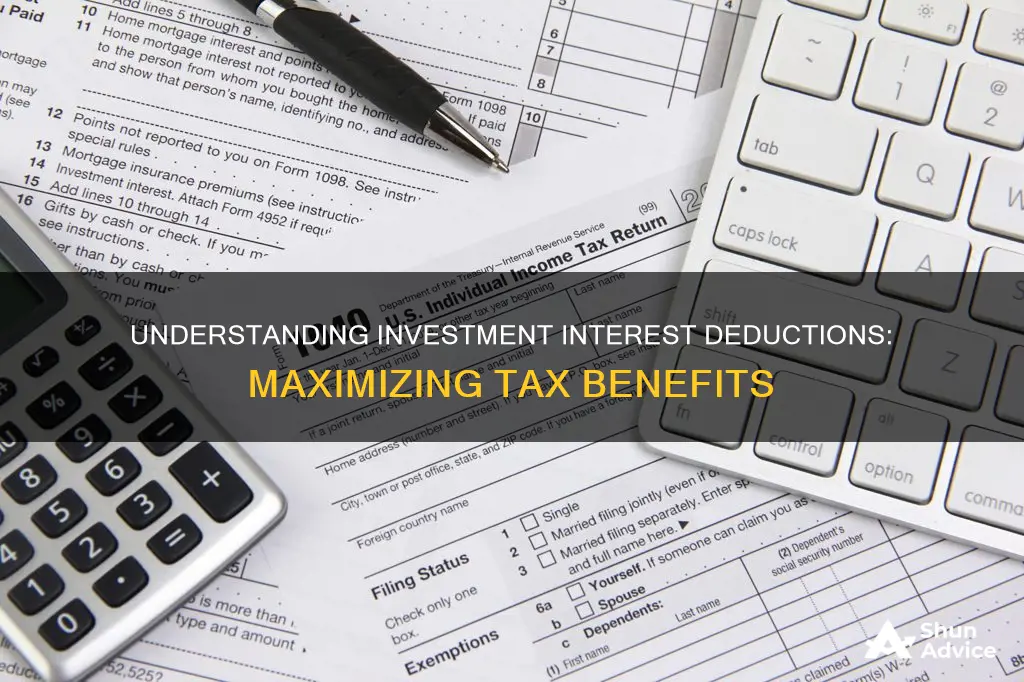
Investment interest expense is any amount of interest that is paid on loan proceeds used to purchase investments or securities. Investment interest expenses include margin interest used to leverage securities in a brokerage account and interest on a loan used to buy property held for investment. Investment interest expenses are tax-deductible in some circumstances, but not when used for passive ventures, such as investing in a business that the taxpayer owns but does not actively manage. The deduction for investment interest expenses is limited to the amount of taxable investment income earned in the same year.
| Characteristics | Values |
|---|---|
| Definition | Any amount of interest that is paid on loan proceeds used to purchase investments or securities |
| Example | Borrowing money from a stockbroker to buy stocks or other investments |
| Tax-deductible | Yes, but only in certain circumstances and not when used for passive ventures |
| Forms | 4952 and 6251 |
What You'll Learn

Investment interest expenses
Only certain types of investment interest qualify for the deduction, and the amount that can be deducted is limited to the amount of net investment income. One common example of investment interest expense involves the use of a margin loan at a brokerage. This is when you borrow money from the firm to buy stocks or other investments. The interest you pay on that margin loan is qualifying investment interest.
To claim an investment interest expense, you must itemize deductions on Schedule A and file Form 4952. The instructions for Form 4952, "Investment Interest Expense Deduction," and Form 6251, "Alternative Minimum Tax—Individuals," instruct taxpayers on how to compute the correct taxes under both systems.
Understanding Fixed-Interest Investments: A Secure Financial Strategy
You may want to see also

Investment interest expense deductions
If you borrow money from a stockbroker to buy stocks or other investments, the interest you pay on that loan is qualifying investment interest. This can be deducted from your taxes, as long as it is less than or equal to your net investment income.
To claim investment interest expense deductions, you need to itemize your deductions on Schedule A and file Form 4952. This form is quite short and consists of three sections: calculating your total investment interest expense, entering your gross income from property held for investment, and arriving at your net investment income.
It's important to note that not all investment interest qualifies for a deduction. Interest incurred from a 'passive activity' investment, such as investing in a business that the taxpayer owns but does not actively manage, generally does not qualify.
Maximizing Investment Returns: Understanding Interest Calculations
You may want to see also

Passive activity investments
An investment interest expense is any amount of interest that is paid on loan proceeds used to purchase investments or securities. Investment interest expenses include margin interest used to leverage securities in a brokerage account and interest on a loan used to buy property held for investment. An investment interest expense is deductible in certain circumstances. An investment interest expense is interest charged for a loan related to an investment, such as margin loan interest or interest on an investment property.
The deduction for investment interest expenses is limited to the amount of taxable investment income earned in the same year. Investment interest can only be claimed by itemizing deductions on Schedule A and filing Form 4952. Interest incurred from a 'passive activity' investment generally does not qualify for the investment interest deduction.
Only certain types of investment interest qualify for the deduction, and the amount that you can deduct is limited to the amount of your net investment income. One of the most common examples of investment interest expense involves the use of a margin loan at a brokerage. If you "go on margin" with your stockbroker, it means you're borrowing money from the firm to buy stocks or other investments. The interest you pay on that margin loan is qualifying investment interest. You can only take a deduction for investment interest expenses that is lesser than or equal to your net investment income.
Invest Wisely: Dave Ramsey's Guide to Smart Investing
You may want to see also

Net investment income
An investment interest expense is any amount of interest that is paid on loan proceeds used to purchase investments or securities. Investment interest expenses include margin interest used to leverage securities in a brokerage account and interest on a loan used to buy property held for investment. An investment interest expense is deductible in certain circumstances. For example, if you borrow money from a firm to buy stocks or other investments, the interest you pay on that loan is qualifying investment interest.
The deduction for investment interest expenses is limited to the amount of taxable investment income earned in the same year. Investment interest can only be claimed by itemizing deductions on Schedule A and filing Form 4952. Interest incurred from a 'passive activity' investment generally does not qualify for the investment interest deduction. The federal tax code includes a number of incentives to encourage investment. Among them is the deduction for investment interest expenses. In general, you can deduct interest paid on money you borrow to invest, although there are restrictions on how much you can deduct and which investments actually qualify you for the deduction.
If an investment is made for both personal and business gain, income and expenses must be allocated proportionally. Investment interest expense is tax-deductible in some circumstances, but not when used for passive ventures, such as investing in a business that the taxpayer owns, but does not actively manage. The amount of investment interest expense that exceeds your deductible amount can be carried forward to future tax years.
Interest Rate Risk: Factors Affecting Investment Volatility
You may want to see also

Margin loan interest
An investment interest expense is any amount of interest that is paid on loan proceeds used to purchase investments or securities. Investment interest expenses include margin interest used to leverage securities in a brokerage account and interest on a loan used to buy property held for investment. An investment interest expense is deductible in certain circumstances. An investment interest expense is interest charged for a loan related to an investment, such as margin loan interest or interest on an investment property.
The deduction for investment interest expenses is limited to the amount of taxable investment income earned in the same year. Investment interest can only be claimed by itemizing deductions on Schedule A and filing Form 4952. Interest incurred from a 'passive activity' investment generally does not qualify for the investment interest deduction. The federal tax code includes a number of incentives to encourage investment. Among them is the deduction for investment interest expenses. In general, you can deduct interest paid on money you borrow to invest, although there are restrictions on how much you can deduct and which investments actually qualify you for the deduction.
Low Interest Rates: Friend or Foe of Investment?
You may want to see also
Frequently asked questions
An investment interest expense is any amount of interest that is paid on loan proceeds used to purchase investments or securities.
The investment interest expense deductible is limited to the amount of investment income received, such as dividends and interest.
One of the most common examples of investment interest expense involves the use of a margin loan at a brokerage. This is when you borrow money from a firm to buy stocks or other investments.
Form 4952, "Investment Interest Expense Deduction", instructs taxpayers on how to compute the correct taxes. You can only claim the investment interest deduction by itemizing deductions on Schedule A and filing Form 4952.
Interest incurred from a 'passive activity' investment generally does not qualify for the investment interest deduction. An investment interest expense is tax-deductible in some circumstances, but not when used for passive ventures, such as investing in a business that the taxpayer owns but does not actively manage.







